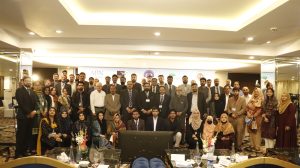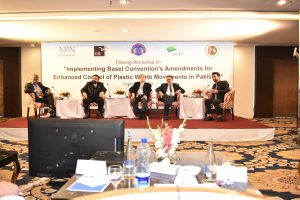COMSATS University Islamabad along with its collaborative partners Engro Foundation and Karachi School of Business & Leadership (KSBL) organized a training workshop on October 26th, 2023 at Ramada Hotel Islamabad entitled “Implementing Basel Conventions on Amendments for Enhanced Control of Plastic Waste Movements in Pakistan”. This collaborative effort was supported from the Asia – Pacific Network for Global Change Research (APN) and Engro Foundation, Pakistan under the banner of ongoing initiative, “Value Chain Mapping and Capacity Building of Pakistani Government Stakeholders to Implement Basel Convention’s Amendments for Enhanced Control of Transboundary Plastic Waste Movements” (www.pvcmspk.com) as an inaugural technical training.
The workshop was graced by distinguished speakers who elucidated crucial aspects of the Basel Convention’s amendments and their implications on plastic waste trade. Inaugural session started with welcome address by Prof. Dr. Sajid Qamar, Rector COMSATS University Islamabad, which was followed by Keynote Speech by Prof. Dr. Habib Bukhari, Vice Chancellor, Kohsar University, Murre who both emphasised the importance of actions needed with reference to climate change including plastic waste management and linked it with our ethical and moral responsibility as citizens.
Dr Jabir Syed, Project Lead, has briefed the participants about the progress and main objectives of the project. Jim Puckett, executive Director Basel Action Network, a prominent figure in this domain, delivered an insightful discourse on the key amendment points, shedding light on the significance of researching and recommending policies. His presentation underscored the criticality of mapping hazardous additives, both locally manufactured and traded products. Another noteworthy contributor. Trainer, Jamil Asghar Bhatti gave an interesting outlook on the waste sector in Pakistan in his presentation. Shiza Aslam, serving as the project’s Research Fellow, delved into a comprehensive analysis. She presented the national metabolism of PVC for the years 2007-2021, aligned with PVC product profiles and sector-specific utility. Her insightful presentation not only highlighted methodological intricacies in quantification but also underscored their far-reaching implications across the plastic value chain. Research Assistant, Ms Khadija Javed also presented the policy analysis of the project.
Besides training workshop, a panel discussion was also organised on the theme “Plastic Waste & Circular Economy” moderated by Dr. Jabir Syed along with the panelists including Dr. Zaigham Abbas from the Ministry of Climate Change & Environmental Coordination, Mr Jawed Ali Khan from UN-Habitat, Pakistan, Dr. Aneel Salman from Islamabad Policy Research Institute (IPRI) and Dr Sajid Rashid from the University of the Punjab. The guests gave their insights on plastic waste, issues, solutions, and the opportunities to create a road map for circular economy related to plastic waste in Pakistan. They also expressed that the government is trying to implement international laws and treaties like the Basel Convention and Stockholm Convention as per the international rules and regulations, however, the behavioural change regarding the use of plastics especially single-use plastics is of utmost importance and needs our personal efforts.
Our collaborative efforts, supported by esteemed partners, continue to pave the way for effective plastic waste management and transboundary control.
Photo Gallery



